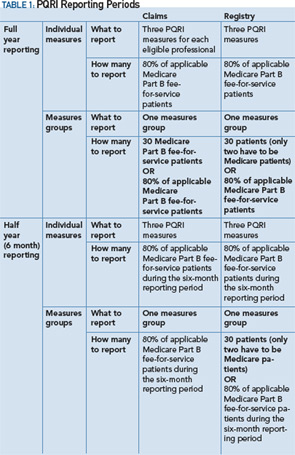If the provider decides to undertake claims-based reporting on a measure group rather than three individual measures, then the CPT II code G8490 (I intend to report the Rheumatoid Arthritis Measures Group) must be reported on the first claim to notify Medicare that the provider is reporting on a measure group. It is not necessary to submit this initiation code more than once.
For the claims submitted representing patients in which all quality actions for the applicable measures group have been performed, the provider may report one single code, G8499, to signify that all of the measures have been completed in lieu of individual CPT II codes for each measure within the group.
It is important that providers work with practice staff to ensure that appropriate PQRI measure codes are applied to submitted claims because CMS does not offer the opportunity to correct missed PQRI reporting (CPT II code). If a claim is submitted with an incorrect or omitted PQRI reporting code, the encounter will be counted as an unsuccessful attempt to report. Practice workflow should accommodate checks to ensure that claims for patients who meet reporting criteria contain both the CPT code and the appropriate CPT II codes on that claim. Providers will receive a remittance advice for claims submitted with CPT II codes with a standard remark code of N365, indicating that the CPT II code was received by CMS and is for reporting purposes only. It is helpful for a practice reporting via claims to keep track of all PQRI cases reported so that claims submitted can be verified against these N365 codes, indicating a successful transfer of reporting data to CMS.
Note that Medicare Part C–Medicare Advantage beneficiaries cannot be included in the population for claims-based reporting of individual measures or measure groups, but they may be included in the registry-based reporting of measure groups.
Visit www.rheumatology.org/practice, and click on “Office Support” for PQRI coding instructions and a complete list of applicable codes for the rheumatology practice.
Registry
As an alternative to claims-based reporting, a provider may participate in an approved registry, which will submit PQRI quality-measure results and numerator/denominator data to CMS on the provider’s behalf. Registry reporting eliminates the need to submit CPT II codes through claims. A list of qualified registries for 2010 PQRI can be found on the CMS PQRI Web page titled, “Qualified Registries for 2010 PQRI Reporting.”
There are several benefits of reporting via registry.
- First and foremost, the success rate for registry reporting is generally much higher than claims reporting—the success rate in 2008 was 96%.
- Registries provide data quality checks to ensure that all submissions are accurate and complete to avoid rejected measurements.
- The ability to enter and view this data at any point throughout the reporting year means that data entry or chart review can be performed retrospectively in a batch format.
- Most registries will allow you to submit your 2010 data right up until the CMS deadline in late February 2011, eliminating the need to track claims throughout the year. If it’s decided late in 2010 to report PQRI data for the past year, it can be done through a registry. This is not so with claims-based reporting.
- Finally, registries often provide more timely access to data and analyzed reports, which can contribute significantly to practice improvement efforts.
The ACR’s clinical quality registry, the Rheumatology Clinical Registry (RCR), is approved by CMS for PQRI reporting. Through the RCR, ACR members and their staff can submit quality data on the RA measures group for the required 30 patients. For more information on the RCR, visit www.rheumatology.org/rcr.
Measures to Be Reported
Providers can choose to report on either three individual measures or a single measures group.

